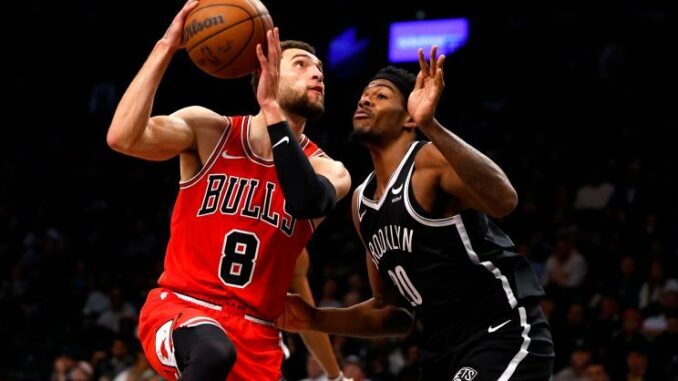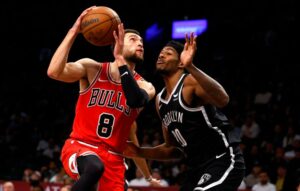
When they were hired nearly four years ago, it was easy to convince Leon Rose and William Wesley to bring stars to the Knicks and attract ballplayers with their extensive contacts.

They have long been power players in the NBA, facilitators of relationships and contracts. Wesley in particular carried with him the mystique of the unknown, the behind-the-scenes puppeteer who was everywhere and nowhere at the same time.It was only a matter of time before their combined Rolodex produced a roster loaded with superstars.Or at least that’s how it seemed. Now the hypocrisy of this narrative, aside from the superstars’ lack of money, lies in the fact that one of the NBA’s biggest agencies, Klutch Sports, has made it clear it would prefer not to do business with the Knicks front office, as multiple sources have done. confirmed to The Post. Frozen connections.This theoretically applies to all of Klutch’s clients, whether free agents or potential trade targets, including Chicago’s Zach LaVine and Atlanta’s Dejounte Murray.And to be clear, this is a much bigger problem for the Knicks than it is for Klutch. Rich Paul, the CEO of Klutch Sports, can negotiate with 29 other teams, some with more cap space, more options and almost all with lower state taxes than the Knicks. But the Knicks can’t negotiate with 29 other agents who have as many high-profile clients as Paul. Why? There aren’t many in existence. And there is probably no one as bold as Paul – or confident enough – to take such a stand against a front office. He is one of the best representatives in the NBA, perhaps No. 1 depending on where you place Paul against Jeff Schwartz, Bill Duffy and Mark Bartelstein.According to a Forbes list from last season, Paul had represented 37 players with $1.36 billion in contracts under management. His current stable includes (but is not limited to):It’s not ideal for a team to lose access to this roster.Nonetheless, there are four important things to note about the Klutch-Knicks standoff:According to a source, while Klutch would be opposed to doing business with the Knicks front office, it would facilitate a deal if a client wanted that location. Klutch obviously couldn’t prevent a trade, but landmines are planted and often explode when a player or their side doesn’t want to be involved. Additionally, the Knicks front office should have learned a long time ago not to underestimate Paul’s influence. As former CAA agents/consultants, Rose and Wesley lost their biggest client ever – LeBron James – because he left with Paul. There is a very real possibility of peace between the Knicks front office and Klutch. As SNY reported, Paul would consider changing his position if a meeting was arranged and his issues were resolved. As far as I know, both sides were ready to meet and it could happen soon. Murray, Klutch’s client and 27-year-old former All-Star, is reportedly on the trading block and is considered “an ideal target” for the Knicks, according to SNY. This would be a huge deal for the Knicks – the biggest trade of the Rose era – and would give Jalen Brunson a premier backcourt partner. Sources say the Knicks are reluctant to trade for LaVine, who is also a target of signings but without a robust market. Why is Klutch against dealing with the Knicks? It’s the question that will no doubt be answered if and when the two sides meet. My only final conclusion is that this can be resolved on business and has nothing to do with the distant history between Paul and Rose/Wesley. They were previously partners at CAA, but Paul left in 2012 to found Klutch. This is not relevant here. However, Paul’s most recent experience with the Knicks wasn’t great.Mitchell Robinson abandoned Klutch in Rose’s first season. Nerlens Noel also left Klutch after signing a contract with the Knicks. Cam Reddish, still a Klutch client, was placed in Tom Thibodeau’s doghouse and then traded. It’s unclear if these are factors in the Klutch-Knicks dispute, but regardless, the front office has a perception problem across the league, not just in one agency.Several agents and NBA officials have expressed concerns to me that the Knicks are too closely tied to the CAA, where Rose was in charge of basketball operations before taking over the Knicks. There is an NBPA “conflict of interest” rule that prohibits player agents from also representing front office executives, lest one hand whitewash the other with favoritism and contracts rather than soap. But there’s nothing stopping a former agent from becoming a managing director – even if, as in Rose’s case, the ties to a particular agency still run deep.Note that the Knicks only have three players represented by the CAA (Josh Hart, Brunson and Isaiah Hartenstein), fewer than in previous seasons. Several members of the front office and coaching team are CAA clients. Then again, this may have nothing to do with the reasons for the cold war between the Knicks and Klutch (I have to commend SNY’s Ian Begley for that name). But it’s obvious the Knicks should figure this out rather than lose access to a top agency.
Leave a Reply